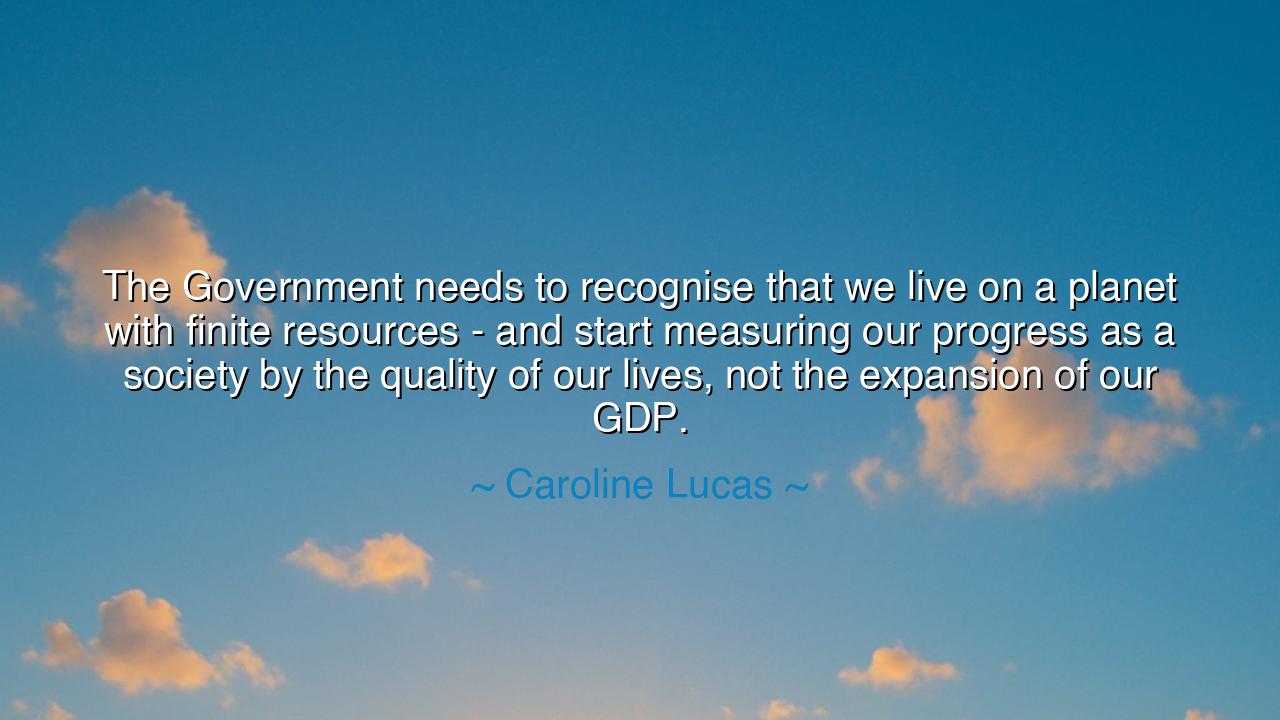
The Government needs to recognise that we live on a planet with
The Government needs to recognise that we live on a planet with finite resources - and start measuring our progress as a society by the quality of our lives, not the expansion of our GDP.






When Caroline Lucas declared, “The Government needs to recognise that we live on a planet with finite resources — and start measuring our progress as a society by the quality of our lives, not the expansion of our GDP,” she was speaking not only as a politician, but as a guardian of the Earth’s truth. Her words echo like a warning bell through the noise of modern civilization — a cry against the worship of endless growth, against the illusion that wealth and well-being are the same. In an age where nations measure success by profit rather than peace, Lucas reminds us that the Earth is not an inexhaustible machine, but a living mother, and that her patience is not infinite. Her message is both a lament and a command: humanity must awaken from its obsession with numbers and remember that the purpose of society is not to grow without limit, but to live well within balance.
The origin of this quote lies in Lucas’s long and courageous career as a leader of the UK Green Party, and her tireless advocacy for environmental justice. As one of the earliest voices in British politics to confront the delusions of economic expansionism, she saw that governments treated GDP — Gross Domestic Product — as a sacred idol, measuring national greatness by consumption rather than compassion. To her, this was a betrayal of both nature and humanity. For what use is a rising GDP if the air grows toxic, the oceans fill with plastic, and the spirit of humankind grows weary beneath the weight of anxiety, inequality, and loss? Her insight draws from the deep tradition of ecological philosophy — that progress is not the multiplication of possessions, but the cultivation of harmony between people, planet, and purpose.
In the style of the ancients, we might imagine Lucas as a modern Cassandra, crying truth to kings who refuse to hear. Her words would not be out of place among the teachings of the Stoics, who believed that the good life is one lived in accordance with nature. “Finite resources,” she says — an eternal phrase that carries the gravity of mortality itself. Nothing that lives can grow forever; what defies balance must eventually collapse. The forests cannot endlessly yield, nor can rivers endlessly cleanse, nor can the human heart endlessly strive for more without meaning. In this truth lies the sacred wisdom of limitation — that life’s value is not found in abundance, but in equilibrium.
History bears grim witness to what happens when societies ignore this law. Consider the ancient civilization of Easter Island, whose people once built vast stone figures in worship of their own grandeur. To raise them, they felled their forests, exhausted their soil, and hunted their animals to extinction. When the last tree fell, their civilization crumbled into hunger and war. Their gods of stone remained, staring blindly toward the sea, but their world was gone. Caroline Lucas’s warning is of the same kind — that modern nations, too, may become victims of their own idols of growth, measuring greatness in profit while the roots of their prosperity rot beneath them. Her voice, then, is the voice of survival — urging us to return to the humility of the Earth before we meet the fate of those who forgot it.
And yet, her message is not one of despair, but of redemption. She reminds us that the true measure of progress lies not in the speed of our consumption, but in the depth of our contentment. A society that values mental health over market share, clean air over cheap fuel, education over exploitation — such a society may not boast of growth, but it will know peace. To shift from GDP to quality of life is to reclaim the ancient moral compass that points toward the common good. It means building communities that care, economies that regenerate, and governments that serve not capital, but creation itself.
This vision has already taken root in small but shining examples. In the tiny nation of Bhutan, for instance, leaders replaced GDP with Gross National Happiness, measuring prosperity not by production but by the health of nature, culture, and spirit. Though small in size, Bhutan’s idea stands as a moral giant among nations, proving that wisdom need not come from power. Lucas’s call, in the same spirit, challenges the great industrial powers to adopt humility — to see that progress without purpose is ruin in disguise.
The lesson of Caroline Lucas’s words is both urgent and eternal: we must redefine what it means to prosper. The Earth cannot endure our illusions of endless growth; our spirits cannot flourish amid endless competition. To honor her teaching, we must live as stewards, not conquerors — to measure our success not by the wealth we extract, but by the peace we create. Let governments learn to serve the living planet, not the market; let citizens demand policies that sustain rather than exploit.
So let this wisdom be passed down as a torch for the generations to come: progress is not measured in gold, but in grace. The health of our world, the joy of our people, the balance of our lives — these are the true treasures of civilization. If we heed her words, if we remember that the Earth’s gifts are finite, we may yet build a future that is not only prosperous, but worthy of the beauty of the planet we call home.






AAdministratorAdministrator
Welcome, honored guests. Please leave a comment, we will respond soon